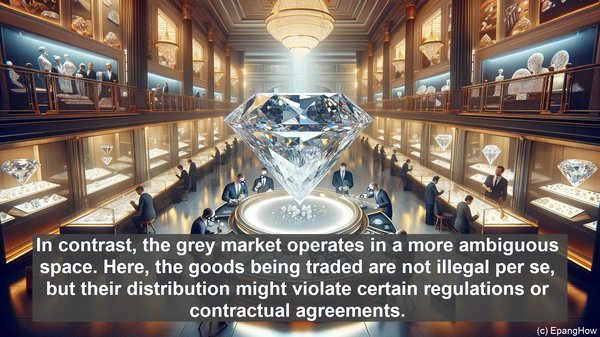Introduction: The Intricacies of Illicit Trade
Hello everyone, and welcome to our video. Today, we’re going to explore the world of illicit trade, specifically focusing on the differences between black markets and grey markets. While these terms are often used interchangeably, they actually represent distinct aspects of unauthorized commerce. So, let’s dive in!

Defining the Black Market
The black market refers to a clandestine network where goods or services are traded illegally. This can involve anything from counterfeit products and narcotics to stolen items or even human trafficking. What characterizes the black market is its complete disregard for legal regulations and the absence of any oversight. Transactions in the black market typically occur in secret, away from the prying eyes of authorities.
Unraveling the Grey Market
In contrast, the grey market operates in a more ambiguous space. Here, the goods being traded are not illegal per se, but their distribution might violate certain regulations or contractual agreements. For instance, purchasing a product from a seller in another country at a lower price and then reselling it domestically, even though the manufacturer has not authorized it, would be considered a grey market transaction. While the goods themselves may be genuine, the act of unauthorized distribution is what distinguishes the grey market.
Factors Contributing to the Existence of Black and Grey Markets
Several factors contribute to the existence and thriving of both black and grey markets. One of the primary drivers is the presence of high demand for certain goods or services that are either scarce or heavily regulated. Additionally, excessive taxation or import restrictions can create incentives for individuals to turn to these alternative markets. Moreover, the rapid growth of e-commerce and online platforms has made it easier for such markets to flourish, as transactions can be conducted anonymously and across borders.

Implications and Challenges
The presence of black and grey markets poses numerous challenges. From an economic standpoint, these markets often result in revenue loss for governments, as they bypass taxation. They can also undermine legitimate businesses, as the unauthorized sale of products at lower prices can create an uneven playing field. Furthermore, in the case of the black market, there are serious ethical concerns, such as human rights violations or the funding of criminal activities. Tackling these issues requires a multi-faceted approach, including stricter regulations, international cooperation, and public awareness.
